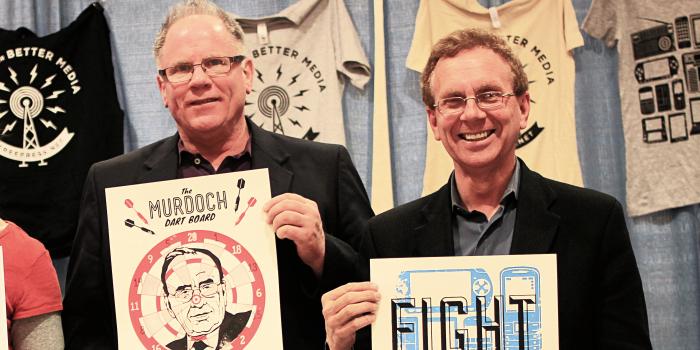New Jersey Leaders Introduce Innovative Legislation to Support News and Information Needs Across the State
TRENTON — On Thursday, the majority leaders of the New Jersey State Assembly and Senate introduced legislation to establish the New Jersey Civic Information Consortium, an initiative joining New Jersey’s leading universities in support of the news-and-information needs of communities statewide.
Assembly Bill A4933 and Senate Bill S3303, introduced by State Assembly Majority Leader Louis Greenwald (D–Camden) and Senate Majority Leader Loretta Weinberg (D–Bergen), would allocate $100 million in proceeds from the federal broadcast-incentive auction, in which the sale of the licenses of New Jersey public-television stations WNJN and WNJT brought in more than $330 million in revenues to the state. The funding for the Civic Information Consortium would be allocated in $20-million annual disbursements over a five-year period.
The consortium would provide grants to support news-and-information projects and programs to benefit civic life and meet the information needs of underserved New Jersey communities. The consortium would be a partnership with Montclair State University, the New Jersey Institute of Technology, Rowan University and Rutgers University. The legislation establishes a governing structure for the consortium while providing initial funding for grants to organizations engaged in this work.
In late 2016, Free Press Action Fund launched a campaign via its News Voices: New Jersey project to urge lawmakers to set aside proceeds from the Federal Communications Commission auction of public-TV station licenses to give residents the news and information they need. In March, Free Press Action Fund and participating universities proposed the formation of the New Jersey Civic Information Consortium to support projects that strengthen public-interest journalism, advance research in the media field, develop and deploy civic technology, and promote civic engagement.
“This legislation is a once-in-a-lifetime opportunity to address the local news crisis and make New Jersey a model for the rest of the nation,” said Mike Rispoli, the director of the News Voices: New Jersey project.
“People rely on locally produced news and information to engage with their neighbors, learn about volunteer opportunities, make decisions about voting, run for public office, get information about small businesses and support their children in local schools,” added Rispoli, who testified on the consortium before both New Jersey chambers earlier this year. “The Civic Information Consortium would support projects that strengthen the kind of public-interest journalism and innovation in civic media that the people of New Jersey urgently need.”
“New Jersey continues to see its media landscape erode as the sector shrinks,” said Dan Gurksis, dean of Montclair State University College of the Arts. “A strong local media ecosystem is important to foster a healthy democracy. Timely, accurate and insightful information is necessary for all New Jersey residents to participate effectively in civic activities. Now is a critical time to invest in rebuilding our news-and-information ecosystem for the benefit of residents in the Garden State.”
“At a time when most newspapers and TV stations keep cutting staff and reducing local news coverage, this bill is a pioneering effort by lawmakers to meet the information needs of New Jersey’s underserved local towns and counties through partnerships between those communities and the state’s public universities,” said Juan González, professor of professional practice at the Rutgers University School of Communication and Information, and co-host of Democracy Now!
According to the legislation, the consortium would report annually to the New Jersey governor and legislature and regularly solicit public input from local communities. To be eligible for a grant, proposals would need to include a collaboration between at least one university faculty member or graduate student and at least one local community organization, media organization or representative of the technology sector. This would ensure that consortium funds are used in communities and outside of a university setting.
Over the past two years, Free Press Action Fund’s News Voices: New Jersey project has worked to build stronger connections between residents and reporters and ensure that local journalism serves community needs. News Voices has convened meetings and helped build networks in Asbury Park, Atlantic City, Camden, Glassboro, Montclair, Morristown, Newark and New Brunswick.




